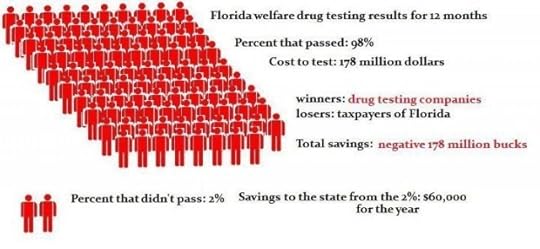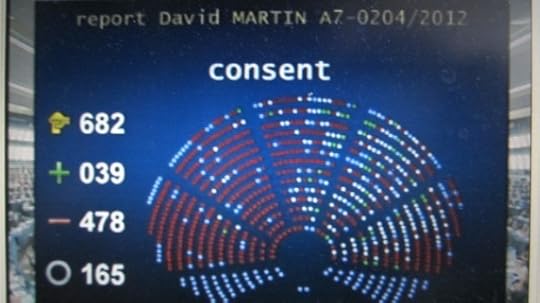Rick Falkvinge's Blog, page 39
July 12, 2012
HEY PEOPLE! Embrace Facts, Don’t Fear Them

Quality Legislation – Andrew Norton: In the age of social media, especially in the run up to an election, people are being bombarded with all kinds of images promoting a political message.People will pass on ones that subscribe to their political ideology, but it’s important to fact-check before you hit ‘retweet’ or ‘share’ a photo to your timeline. Not all images are based in reality.
A frequent problem now is that people are ABSOLUTELY PIG IGNORANT a lot of the time on political topics. I’m not just talking about the person in the street, I’m talking about POLITICIANS as well. From the Louisiana State Rep. who not only thought that ‘religious’ meant ‘Christian’ (as in redneck, bible belt, sod-thy-neighbor Christianity) and not Muslim, but that the Founding Fathers of the US were Christian (they weren’t, they were mainly Deist); to the former Governor of Alaska not knowing what CENTURY the US Pledge of Allegiance was written in (for reference, it was written in 1892 and not adopted as the formal pledge until 1942).
The problem is, clueless politicians like these (who likely wouldn’t pass a US Citizenship test) only have a chance of being elected, if the populace is even more clueless. A major reason is the lack of requirement for news to be factually based. But increasingly it’s also because of social media.
Take this image that did the rounds again on Facebook following the Supreme Court decision to uphold the Affordable Healthcare Act.

Source, and copyright owner unknown, used under Fair Use law for critique
First seen late 2009
Seems like a persuasive message, yes? Facebook group “Conservative Patriots of America” shared this picture on June 29th. Sure they added a link at the end of the description that it’s not actually true, but they shared it anyway. Their message reads
Conservative Patriots of America
Although, the text on this truck is not exactly what is happening, it has been seen on the streets in America — below, I share an article from Forbes debunking the “exempt” status of our Reps, and meanwhile, the People are speaking, and it is going to get A LOT LOUDER — are YOU ready, Patriots??
Congress Exempted From Obamacare? – Forbes:
http://www.forbes.com/sites/rickungar/2011/12/08/congress-exempted-from-obamacare/
“SHARE” this posting to inspire your camp.
It was shared over 42,000 times, with 5100+ ‘likes’, just on that one instance, there are undoubtedly more. And what an example they are. “we know it’s not true, but we’re going to post it anyway because it fits our message’.
Of course many comments also pointed out the lie, but people don’t tend to read the photo’s comments, they read the comments of their friends when they share it.
So, a response image was made. This was posted to ‘Being Liberal‘

Taken from Being Liberal page. Used under Fair Use for Critique.
This post wasn’t spread so widely (4928 likes, but only 2912 shares at present), perhaps because it doesn’t stir the anger as the original picture did. It’s more of a humor thing, and humor is a more subjective thing. We can all get angry about a perceived injustice, and share it to help ‘inform’ our friends. Yet the correction image is more difficult in a social situation. If friends and/or family had earlier shared the first picture, and voiced agreement, many will not share this corrected one, for fear of upsetting, insulting or demeaning them. It’s the problem that has plagued those who have been deluged with chain emails, never-ending forwards, and even Nigerian scams. The ego has become more important than teaching facts.
It’s a problem that’s not just confined to the ideological Right (although strictly speaking, what is termed ‘the left’ in the US is still objectively right-wing). but also rears it’s head in the ‘liberal’ groups as well.
24 hours ago, the following image was posted to the page “1,000,000 Strong to Help Improve Tea Party Patriots’ Spelling and Grammar”

Source, copyright owner unknown, but used under Fair Use for Critique
There’s problems with that, massive problems as the figures are WAY OFF. I was not shy to point it out. To their credit, the page admin (who also apparently lives in Georgia) asked me if I’d make a corrected one. And so I did.
However, they didn’t take the above picture down. At this moment, it’s got 241 ‘likes’ and 305 shares, and a LOT of comments about it being wrong.
Here’s the corrected version I created.

CC-BY-NC-SA by K`Tetch
And the caption I put to it:
There was an image doing the rounds with figures for this in the millions. The reality isn’t THAT bad, but I’ve corrected the figures and added a little more information.
It still shows that the program is a net-loss (except for the few, like the Florida Governor, with a financial interest in a drug testing company) and that people applying for Federal Assistance are less likely to be on drugs than regular citizens.
FULL DISCLOSURE I actually made an error in the image first time around. It was only when I was writing this piece about it that I noticed I’d said 98% passed. In reality 98% did not fail, 97% passed.
Apart from myself, no-one’s shared it (yet) but again, it’s the problem of ego, of not wanting to upset or anger people by pointing out that things they believe are wrong.
It’s why the quality of discussion is forever spiraling into the drain. People are afraid to be wrong. Tactical voting exists because people are afraid they won’t have voted for the winner (or a close runner up). It’s why ‘mediums’ and psychics exist and flourish (despite being Bullsh*t), and why people still turn to watercures, or homeopathy and believe in Astrology (again, all bullsh*t) and why Creationism has been a hotly contested topic over the last 15 years in school districts across the US – despite there being zero evidence to support a creationist argument.
As a nation, is the ego so fragile, withered, and feeble that it can’t withstand critical examination. And why have beliefs been permitted to foster, and even be encouraged, even when they are naught but lies. It’s perhaps why people talk in vague abstractions, when dealing with the country, because the reality and the specifics, as illustrated in this TV clip, are hard for people to swallow.
It’s long been said that it takes a big man to admit when they’re wrong, and an even bigger one to do something about it. It’s time America showed how big it is.
INFOWhile this piece specifically targets the US, the same is true nowadays in many countries around the world. Combating baseless claims with facts is a major part of the work undertaken by the various Pirate Parties

Bad Faith From European Commission Indicates CETA May Be “ACTA, Episode II” After All

Infopolicy: Last Wednesday, we defeated ACTA, when the good forces on the inside and outside of European Parliament cooperated to defeat the corporate-rule European Commission. It didn’t take many days before
another trade agreement surfaced, uncovered by Michael Geist, that looks like a back door for the ACTA provisions if ACTA as such was rejected by the European Parliament. It’s called CETA and is a trade agreement between Canada and Europe.
At the time, I said that this alone did not necessarily mean that the European Commission would try railroading an ACTA facsimile through Parliament – the leaked CETA drafts came from February of this year, when it seemed like ACTA was a done deal. Therefore, seeing identical texts was… well, logical, as they would have written in February of 2012. The draft texts could be seen as a time capsule of the expectations of their time.
My assessment would be that the European Commission is still in a state of shock over the forceful and complete rejection of its intended direction. Seeing that this was less than a week ago, we are realistically still months away from a new direction materializing. As typical office workers, the Commission bureaucrats can choose one of two directions here – they can either learn from this very costly mistake, backtrack and re-plan, which is very expensive both in terms of organization and money, or they can just steamroll ahead as if nothing happened. The latter is a politically very risky maneouver, given the decisive rejection of ACTA, even if the human cost short-term is lower – and the Commission is quite smart and suave, so I doubted they would bet any further prestige in getting intellectual property rights override civil liberties and fundamental rights no matter what the cost.
However, MEP Christian Engström attended a meeting with the Commission’s responsible person for CETA yesterday, a chap named John Clancy who was previously responsible for ACTA, a person that Michael Geist also mentions by name. MEP Engström blogged about that meeting later, concluding that CETA indeed looks like the “First Zombie ACTA”. Quoting MEP Engström:
Yesterday, I attended a post-mortem seminar on ACTA in the European Parliament. One of the panelists was the civil servant from the EU Commission who used to handle ACTA, and who is now in charge of the CETA negotiations.
I took the opportunity to ask him about CETA, and if it wasn’t true that CETA contains a chapter on intellectual property rights where certain provisions have been copied verbatim from ACTA.
The reaction of the Commission official was very interesting. He confirmed that CETA does indeed contain a chapter on intellectual property, but then immediately went on to try to belittle Professor Geist (without anybody else having mentioned Professor Geist’s name).
According to the Commission representative, Professor Geist should not be taken seriously, since he was commenting on a draft that was six months old, and the text had changed since then.
When I asked the obvious follow-up question, if the Commission had published a more current version of the text under negotiation, the answer was no.
MEP Engström, as well as his assistant Henrik “Hax” Alexandersson, recognize the attitude of belittling Parliament as identical to the attitude displayed from the Commission towards Parliament in the ACTA showdown, and draw the conclusion that bad faith is present all over CETA:
So it appears that it will be déjà vu all over again. The unelected EU Commission is negotiating an international agreement with legislative effect behind closed doors. They are keeping all documents secret, while arrogantly claiming that everybody who is questioning what they are doing is misinformed. Same procedure as last time.
Henrik “Hax” Alexandersson elaborates:
It would look as the Commission is really going to try steamrolling the CETA agreement no matter what. It suffers from the same substantial problems as ACTA. The opposing teams are the same as over ACTA. The secrecy is the same as over ACTA. And the entire political battle will have its first rerun. Kind of. [...]
The Commission representative, John Clancy, made it perfectly clear that the Commission intends to proceed with CETA as though nothing had happened. That is, the Commission doesn’t seem to care that it was sent back to the drawing board for the exact same political substance in the fall of ACTA.
Still, while this is a strong indication, I would not say with certainty yet that the Commission is going to try this catastrophically dumb stunt. I try to apply the lowest-friction explanation to most things I see in order to understand what’s going on.
So rather than going all analytical on political aspects, I find that a lot of the things happening in politics are easier to explain if you try to picture the individual people behind the scenes, imagine their situation, and look at what their options and feelings would be. In this case, you have bureaucrats who have been negotiating a huge trade agreement between Europe and Canada, probably for well over a year, only to have your year-long work fatally torpedoed on July 4. This date is seven workdays before your six-week summer vacation starts, which is the only regular break from papers, more papers, and yet more papers you’re ever getting in your career. Are you going to immediately call crisis meetings and rewrite the whole thing, or are you going to shrug your shoulders and count down the minutes before you leave for vacations?

SCIENTIFIC ILLUSTRATION: The statistically average reaction of a bureaucrat who has just had a year’s worth of hard work torpedoed seven workdays before a six-week summer vacation.
It would still be logical that these people would say “no, you can’t see the agreement”, regardless of whether they were going to rewrite it after summer, not rewrite it at all, or most likely, haven’t cared to think about that decision point yet because summer vacations are just around the corner. But this belittling attitude is still a significant warning sign, and it should intensify the CETA blip on all our radars.
Now, however, the Commission bureaucrats are leaving their jobs to get wasted, high, tanned, and laid for the next six weeks. European Parliament is going to be just as empty. So even if we wanted to protest and mail and pester the officials, there’s nobody there for the next six weeks.
So rather than risking acute activism fatigue (hey, we just defeated ACTA!), I think we should follow the bureaucrats’ example and enjoy some R&R for the next couple of weeks. The showdown over this thing called CETA continues in late August or early September at the earliest.

July 11, 2012
In The UK, You Will Go To Jail Not Just For Encryption, But For Astronomical Noise, Too

Repression: There was some surprise in the comments of yesterday’s post over the fact that the United Kingdom has effectively outlawed encryption: the UK will send its citizens to jail for up to five years if they cannot produce the key to an encrypted data set.
First of all, references – the law is here. You will be sent to jail for refusing to give up encryption keys, regardless of whether you have them or not. Five years of jail if it’s a terrorism investigation (or child porn, apparently), two years otherwise. It’s fascinating – there are four excuses that keep coming back for every single dismantling of democracy. It’s terrorism, child porn, file sharing, and organized crime. You cannot fight these by dismantling civil liberties – they’re just used as convenient excuses.
We knew that this was the next step in the cat-and-mouse game over privacy, right? It starts with the government believing they have a right to interfere into any one of your seven privacies if they want to and find it practical. The next step, of course, is that the citizens protect themselves from snooping – at which point some bureaucrat will confuse the government’s ability to snoop on citizen’s lives for a right to snoop on citizen’s lives at any time, and create harsh punishments for any citizens who try to keep a shred of their privacy. This is not a remotely dystopic scenario; as we see, it has already happened in the UK.
But it’s worse than that. Much worse. You’re not going to be sent to jail for refusal to give up encryption keys. You’re going to be sent to jail for an inability to unlock something that the police think is encrypted. Yes, this is where the hairs rise on our arms: if you have a recorded file with radio noise from the local telescope that you use for generation of random numbers, and the police asks you to produce the decryption key to show them the three documents inside the encrypted container that your radio noise looks like, you will be sent to jail for up to five years for your inability to produce the imagined documents.
But wait – it gets worse still.
The next step in the cat-and-mouse game over privacy is to use steganographic methods to hide the fact that something is encrypted at all. You can easily hide long messages in high-resolution photos today, just to take one example: they will not appear to contain an encrypted message in the first place, but will just look like a regular photo until decoded and decrypted with the proper key. But of course, the government and police are aware of steganographic methods, and know that pretty much any innocent-looking dataset can be used as a container for encrypted data.
So imagine your reaction when the police confiscate your entire collection of vacation photos, claim that your vacation photos contain hidden encrypted messages (which they don’t), and sends you off to jail for five years for being unable to supply the decryption key?
This is not some dystopic pipe dream: this law already exists in the United Kingdom.

July 10, 2012
What To Do If Prosecuted For Sharing Culture: STFU

Process of Law: Every now and then, somebody is prosecuted for sharing culture in violation of the copyright monopoly. Here’s what you should know if you’re worried of that happening to you.
The most important thing to know is that it won’t happen to you. The copyright monopoly lobby likes to publicize every case to ridiculous proportions. Back in reality, outside of copyright monopoly math, more people get struck by lightning each year than get prosecuted for sharing culture.
Let’s take that again, because it is important: mathematically, you stand a higher risk of being struck by lightning than of being prosecuted for sharing culture. (Note that this does not apply to people who annoy Hollywood on purpose, which is a separate and much more serious crime.)
But on the astronomically odd risk that you should be struck by lightning prosecuted for sharing culture, you need to know the next important thing: every conviction I’ve seen of copyright monopoly violation in direct sharing cases has been due to a confession.
Again: every conviction has relied on a confession.
In other words: do not confess to sharing culture in violation of the monopoly (in a prosecution situation, that is – everybody is assumed to be a good citizen and share; it’s nothing much to “confess to”, really).
You need to understand what the Police will tell you in order to try to get that confession. They’ll say that the copyright monopoly violation came from your IP address. They’ll say that they found the shared material on your hard drive.
None of that matters. Again: it doesn’t matter if they find something on your hard drive that matches your IP. The crime isn’t having the bits of data – the crime is transferring the bits of data. That distinction is crucial. Actually, it’s not even enough to transfer the data: you need to have transferred it in a way that violates the monopoly, and far from all copies do that.
The police need to show that you, personally, transferred this bitpattern in a way that violated the copyright monopoly. That’s practically impossible to prove. Having the bitpattern on your hard drive is not a crime in itself, except in North Korea.
Preferably, you shouldn’t say anything at all in an interrogation situation. If you feel you have to say something, ask the Police if there’s any coffee and cookies.
But if you’re still worried, there are two easy things you can do. Karma points for both of them.
The first thing to do is to encrypt your whole hard drive, which is a good thing to do anyway. For Windows and Mac, you can use TrueCrypt to do this. You’ll get a password prompt as the computer boots, and after that, the encryption is transparent. For GNU/Linux, you get the option of encrypting the whole drive when you install the operating system; I’m sure there are ways of adding encryption afterwards. On Android, you can encrypt the whole drive, too: it’s part of the screen lock menus somewhere.
As the police will turn off your computer the first thing they do in a raid to prevent you from erasing evidence, they will also lock themselves out of said evidence on power-down. They’ll lie to you afterwards and claim that they found X, Y, and Z on your hard drives, again hoping for a confession. They didn’t. You can just smile at them and say nothing.
You don’t have to justify having an encrypted hard drive to the Police or anybody. This is tremendously important. If you’re asked why it’s encrypted, you don’t have to feel threatened in the slightest; it is entirely within your rights to protect your data from intruders, legal or otherwise. This is true in all countries that I know of except for North Korea, Iran, and the United Kingdom. You can smile and shut up or just shrug your shoulders and say “because I felt like it”. Or, for that matter, change the subject and ask if there’s any more coffee.
The second thing to do is to have an open wireless network. This is also a matter of being a good neighbor. I have two wi-fi networks, one closed and one open (most modern routers allow this). Both egress on the same IP address toward the net, so if somebody is sharing culture from this IP address, it could be me or any of my 50-or-so neighbors in range. And with an encrypted hard drive, there’s nothing even suggesting it was me in an astronomically unlikely raid scenario.
Of course, sharing wireless bandwidth with my neighbors when they may need it is also a matter of practicing what I preach; sharing is caring.
This latest defense – the open wireless defense proved so successful in Denmark that the copyright monopoly lobby even stopped suing people sharing culture, because they couldn’t get any convictions. They’re now trying other avenues. (This was regardless of whether there even was an open network, as civil lawsuits don’t confiscate equipment in a police raid.)
So in summary, an encrypted hard drive is little extra work but will mean that the confidences placed in you are safe in a raid scenario, and an open wireless network will negate any connection between you and your IP address. Anybody accusing you of sharing culture in violation of the monopolies won’t be able to get a shred of evidence of it, even with a full-scale police raid.
(In reality, outside of copyright math, the encrypted hard drive is much more likely to protect your data in a case of burglary than a police raid – and the open wireless is much more likely to benefit you with better neighbor relations.)
TL;DR: TrueCrypt or LUKS. Open wireless. STFU.

July 9, 2012
Alarm Over CETA Appears Premature

Infopolicy: Yesterday, the net’s alarm bells went off all at once regarding a new trade agreement – CETA, an agreement between the Canada and the European Union – that would sneak ACTA’s provisions into law through the back door, now that ACTA had been forcefully rejected by the European Parliament. The whole net was angry with the European Commission and its disrespect for democracy. I think such alarm bells are premature.
The original post came from Michael Geist, and it was followed up on BoingBoing and Techdirt before long. Geist lists several passages of the new trade agreement, CETA, side by side with passages in ACTA, showing us how the two are identical in passages.
However, the net reacts as though this was written after it was clear that the European Parliament would reject ACTA, or even after the rejection itself last week: that it was an intentional back door for the same provisions. The timeline doesn’t support that conclusion.
The leaked CETA documents – the live versions of which are still being negotiated, by the way – were written in February 2012, according to Geist. The reason they reiterate exactly what is written in ACTA is much easier explained by the documents being written before the street protests started: those documents were simply written in the assumption that ACTA was practically a done deal just needing rubberstamping, and so, the negotiators copied material from ACTA as a background for the new agreement.
This was more than a reasonable assumption from the European Commission in February 2012; it was even the way I would have expected them to do their job, whether I liked it or not.
Today, however, reality looks completely different. The Europarl is watchful of anything that resembles ACTA and gave the European Commission the bitchslap of its life in the rejection of ACTA. If the Commission tried anything like that today and again, like with this CETA thing, they’d be a) acting in bad faith, and b) asking for the political bitchslap of their lives squared – possibly up to and including being fired by Parliament. (A resignation of the responsible Commissioner, Karel de Gucht, was hinted at during the ACTA proceedings – and Parliament is going to regard another attempt at doing the same thing with an utter lack of humor.)
So this is not “ACTA rises again”. This is not “ACTA, the First Zombie Remake”. This is an entirely logical document as it would have been written in February of 2012, written with the political assumptions of its time in mind.
Today, reality looks starkly different. If the European Commission thinks they can get anything like this through European Parliament, they’re ignorant and stupid. The Commission can sometimes come across as ignorant, due to their lack of contact surface with ordinary citizens, but they’re very very far from stupid.
That said, now that the alarm bells have gone off, it’s doubtful if CETA will pass if it’s even remotely similar to ACTA. We’re at the level where being printed on the same kind of paper may be too much – ACTA is that toxic. I expect the net will keep its watchful eyes on continuing CETA developments to alert Europarl of any foul play, but we’re not quite there yet.
Concern, vigilance, distrust, and watchfulness – absolutely. But panic and alarm would appear premature at this point.

European Parliament Showered With Flowers Over ACTA Rejection

Activism: The European Parliament’s mail room looks like a florist’s shop, with bundles of flowers on every flat surface. Hundreds and hundreds. There are flowers being carried by somebody in practically every elevator ride. Those are the inside reports from the European Parliament in the wake of the ACTA rejection.
On Thursday July 4, the European Parliament rejected ACTA overwhelmingly.
It would appear many citizens of Europe and the world took Thursday’s suggestion from here to heart:

Screenshot of the article on the eve of July 4, ACTA rejection day, suggesting a flower shower over Parliament
The idea of sending flowers was carried and spread by many (766 shares and counting – each +1 of the +766 is one share somewhere, and one share can reach just one other person or it can reach hundreds of thousands), but from what I’ve seen, I’d like to give particular credit to Glyn Moody, the Anonymous hive, Enrique Dans, and Kim Dotcom for using their range and reach to spread the message, but do note that they’re still just one +1 each. This was a grassroots reaction.
So what does it look like in Parliament, then?
Members of European Parliament are starting to tweet about it, and they herald it as a career first:
First time ever I received flowers for voting right: “Thank you for voting no to ACTA!” Roses, lilies etc. – Thank you! twitter.com/bueti/status/2…
— Reinhard Bütikofer (@bueti) juli 9, 2012
Diolch i bwy bynnag anfonodd y blodau hyfryd ataf. Thanks to whoever sent the lovely flowers to me for my anti ACTA vote #ACTA #plaidcymru
— Jill Evans ASE/MEP (@jillevansmep) juli 9, 2012
Har fått enorm bukett till kontoret. För att jag röstade nej till #acta. första gången jag får blommor för något beslut jag tagit. #svpol
— Åsa Westlund (@AsaWestlund) juli 9, 2012
Merci à / aux anonymes qui m’ont fait livrer des fleurs au PE pour #ACTA au nom “du peuple d’Europe”. Très émue ;-)
— Francoise Castex (@FrCastex) juli 9, 2012
Christian Engström, Pirate MEP, has written a blog post about it, and Pirate MEP Andersdotter’s assistant @Senficon has posted pictures, too.

Close-up of flowers, with note “Thank you for helping reject ACTA last week”
Still, I predict most of the flowers will arrive tomorrow Tuesday rather than today. I’m very happy that so many chose to follow the suggestion and do as I did, sending flowers to a random Member of European Parliament who helped preserve our civil liberties against encroaching corporate interests.
Unfortunately, photos are not allowed in the mail room (for obvious reasons). We’ll see if our heroes in Parliament get over the surprise to take more of a group photo soon enough…

July 6, 2012
Aftermath of The Pirate Bay Trial: Peter Sunde’s Plea – In His Own Words

Corruption: Some probably see Sweden as a country where proper due process of law prevails, or at least exists. Others would very much like to see Sweden as such a country. One thing that this country has shown, is that when the interests of its establishment are threatened, all the branches of government fuse into one and cut any corners needed to neutralize the threat to its establishment, rules and rights be damned.
On April 17, 2009, a verdict was handed down that led the world to blank stares of disbelief, then furious anger. The two operators of The Pirate Bay, its media spokesperson, and a fourth unrelated person were sentenced to one year in jail each and damages that, by now, well exceed 10 million euros. This was essentially a declaration of war against an entire generation. The case was appealed and lost, and the Supreme Court denied to hear the case, to everybody’s surprise except the establishment’s.
Call for Action
Did you send flowers yet to the Members of European Parliament who voted to kill off ACTA?
A few days ago, Peter “Brokep” Sunde – the former media spokesperson of The Pirate Bay – sent a formal plea for pardon to the Swedish Administration. This is a procedure where you can get a judicial sentencing undone by the political administration in exceptional circumstances, as part of checks and balances between the branches of government. It is practically never granted, but Peter saw it as a way to get his version into permanent governmental records – and to get a written and signed statement that no error had been committed in these circumstances. As Peter wrote in Swedish: this was not written with the intention to take it into HTML format, but any claims and facts in the text can easily be verified in Swedish-language media by any reporter wanting to do so. I have taken the liberty to insert a few references – some for reference, some for the Swedish context.
This is a long text, but worth reading. It was only as I translated it from Swedish, forcing me to really contemplate its meaning in detail, as the full egregiousness of it all hit me.
Peter’s Plea
I’d like to tell a story from my life, a story that has come to have great importance – not just to me, but to the global and emerging Internet. I happened to get a role in the eye of the storm. For your consideration of the submitted plea, I feel that this letter is needed: an insight into what has gone wrong, and why you need to fix this. You see, indirectly, I do not ask pardon for myself. I ask pardon for a judicial system that has been steamrolled over by lobbyism and ignorance. But ultimately, I ask pardon for our future culture and communication. My case has significant impact on these.
This is a long story, so let’s get started right away.
A little over six years ago, something odd happened in Swedish history. The Police conducted a raid at twelve locations in Sweden. 65 police stormed in at these locations and searched for something and anything that could be used as evidence against a search engine on the Internet.
Nothing like this had every happened before in Sweden, and will quite likely never happen again. The days that followed produced tens of thousands of articles around the whole world. Thousands of people, mostly young adults, took to the streets all over the nation and protested. They protested that their cultural life had been violated.
I attended one of these protests, having a political interest and being the media spokesperson for the search engine in question. A search engine helping people all over the world to get in touch with each other to exchange information. A search engine so appreciated, that almost every day, a mail arrived from somebody telling the story of how it changed their life. Pictures of tattoos with its logo proudly inked onto someone’s body. Acclaims to the Swedish web service that changed people’s lives. The protests boiled down to just this: people felt steamrolled over, all across the world. I remember standing in the Mynttorget square on an early morning in the beginning of June, 2006, watching representatives from all parties in Parliament screaming out their fury over what had recently been uncovered: the United States had threatened little Sweden with trade sanctions if the web service wasn’t shut down[1].
The Swedish Public Television’s newscast Rapport had told the embarrassing story. Mighty Hollywood demanded that the White House would force Sweden to do something about the cultural exchange going on outside of Hollywood’s control. The Swedish Minister of Justice at the time, Thomas Bodström, was called into a meeting in the White House and was informed of the consequences of non-compliance: trade sanctions from the United States against Sweden within the context of the WTO. Sweden could become a second Cuba.
A few months prior, a Swedish prosecutor had arrived at the conclusion that this service could not be sentenced for any crime in Sweden. He sent a memo explaining this to his superiors. After a meeting between representatives from the Justice Department and Sven-Erik Alhem, the over-prosecutor at the time, the prosecutor in question reconsiders. A quick raid was required, with full force. So full a force, in fact, that when the raid is actually conducted, the police have no idea what to grab. They seize hundreds of computers, in several cities, but also loudspeakers, cables, and the like. They don’t know the size of the things they’re supposed to be looking for, and decide – during the raid in session – to rent trucks from local gas stations to ship off all the seized goods. In short, it is stressful, unplanned, and ill considered. So ill considered that the police even missed several locations where the target of the raid had ongoing activities.
Thomas Bodström promised to come clear with what had happened. And yet, over 700 mails between him and the United States regarding this matter were (and remain) classified as secrets of the State. We still haven’t seen them. In the aftermath of the political scandal that was uncovered, Swedish national records were set in charges filed with the Constitutional Committee (Konstitutionsutskottet), Parliamentary Ombudsman (JO) and Chancellor of Justice (Justitiekanslern). The newly-founded Swedish Pirate Party became one of Sweden’s largest in a matter of days. A few weeks later, an election was held. None of the young wanted to vote for the ruling Social Democrats any longer, knowing that the Social Democrats had sold out their interests to rich lobby organizations in the United States. The Social Democrats lost power, partly because of this scandal.
Only two days after the raid, The Pirate Bay was back online. It’s an easy service to copy, and with no advanced functionality. That was one of the major features with the underlying technology, being smart and easily maintained to that level. It was so easy to maintain, nobody had practically touched it for a year at the time of the raid.
The attention around The Pirate Bay only grew after this. It might have been a large service before, but it was suddenly one of the world’s 100 largest services. Global media called non-stop.
My involvement in The Pirate Bay had been one, and one only: media spokesperson. Suddenly, images of my face were being printed onto front pages of all the world’s newspapers. I was invited daily to television and radio to discuss the political issues surrounding file sharing. Debates raged for days on end, and I hardly found any time to do my day job, thinking this was such an important issue. I grew more and more active in the political aspect of the topic after the raid, and indirectly, I became a representative of those who say that file sharing is something positive for society as a whole.
The raid was harsh and forceful. As mentioned earlier, it took place at twelve locations in Sweden. Myself, I lived in Oslo, Norway during this time, seeing myself as very peripheral in this context. My acquaintances from The Pirate Bay had been informed of charges pressed against them, but nothing more happened for a very long time. After about two and a half years, I got a letter. At this time, I had moved to Sweden, and I was being called as a witness, being called to give my deposition to the Police in a few weeks’ time.
About 30 people were called as witnesses. Some were known to me, some I’d never heard of. Time passed and I was supposed to go to the police station to give a deposition. Just the day before, the lead interrogator Jim Keyzer (who was also responsible for the entire investigation) calls me and tells me I’ll be charged with a crime on arrival. He tells me that this being the case, I have the right to have an attorney present. He doesn’t stop there, but also gives me the tip of picking “just about the first lawyer you can find, as we’re in a hurry to get this over with”. He adds that I should “skip picking a hotshot lawyer from Stockholm” so his work wouldn’t be further delayed. All of a sudden, the investigation is in a world of rush to get concluded.
Now, I’m a reasonably intelligent person. Obviously, I see that something is odd when a policeman asks me to pick a bad lawyer. Therefore, I immediately called the first good lawyer I knew, Peter Althin[2]. Althin took the case immediately, and called the policeman in question. The policeman got upset and enraged as he had already planned his trip to the city of Malmö, where I would be heard, and found it enraging that he had to schedule a second trip to the city.
A few weeks later, Jim Keyzer came to Malmö to question me. My lawyer was with me, and both he and I felt that something was very odd. My lawyer told me that in his long career with many high-profile cases, he had never seen such a rude and stressed-out interrogator. He found it very odd indeed. Myself, I thought it felt like a scene from a bad movie, when Keyzer screamed at me that I was being childish in responding “no comment” (as I didn’t want to say anything that might affect my friends). In a few locations in the transcription of the recorded hearing, the transcription just reads “unhearable”. That’s when Keyzer is outraged and yelling so loudly that the microphone is unable to record the sound.
It may appear odd that I’m placing such emphasis on Keyzer here, but there’s a point to it. It’s the handling of this case. Sweden has a reputation of being a country with high morals, sans corruption and with common sense guiding its justice. In my case, this has been shoved aside. Jim Keyzer is one of many examples of this.
One week after the filing of the concluded investigation, one of my acquaintances noticed that Jim Keyzer had changed his “network” on Facebook. He was no longer part of “Police Authority in Stockholm”, but was now part of the “Warner Brothers” network. Warner Brothers is one of the corporations behind the charges against The Pirate Bay. I got very upset and called Jim Keyzer to ask him what was going on, and was informed that he had changed jobs and was working for Warner now; Warner and NBC Universal, another corporation behind the charges (not to mention the political pressure). Warner and Universal are also part in the Anti-Pirate Bureau (Antipiratbyrån), an organization which was one of the formal plaintiffs during the trial. Keyzer’s new role was anti-pirate manager for these organizations. He had started his new job the day before the investigation was formally concluded.
Jim Keyzer’s first assignment for his new employer was to locate a co-defendant, Gottfrid Svartholm. Gottfrid is a nomadic young man who frequently lives with friends. Since Keyzer had been able to use police resources to get information on Gottfrid’s whereabouts, he went to that location to serve the civil lawsuit part of the criminal case that he, himself, had investigated for upwards of three years. Keyzer did run into Gottfrid by chance, and did not disclose his change of employers.
Using my rather far-reaching network, I looked closer into at what time, exactly, that Keyzer signed on with his new employer. It turned out that his new employer had posted the job opening publicly, and in a few meetings about the ongoing investigation, Keyzer had been informed that he may be a good fit for the new position. After some more digging, I located a person who had applied for the same job. He could tell me the exact date when he was informed that the position had been filled by another applicant: eight days before I was upgraded from “witness” to “defendant” in the case. And seven days before Keyzer started calling and telling me what a rush it was to hear all witnesses. Accordingly, the only time I met with a policeman during the entire time of the investigation was with the very policeman who had already got a well-paying job with my adversary in the case. A policeman going from almost no speed at all, to having to close the investigation in one day. In a hearing that my lawyer perceived as one of the oddest in his long career.
At the time of that hearing, I was also the most hated person in the power corridors of Hollywood. I was the one individual most important to silence, being the media spokesperson for their nemesis. Young people all over the world listened to me as I told them of the fantastic opportunity we have for a free and open, participatory culture, as long as we don’t have to be locked up by these corporations. I spoke with all kinds of people – from teachers and students, to presidents of some of the world’s largest countries – about the opportunities and the threats on the table. The threats were mostly the adversaries in my case.
As the case came up in a Swedish District Court, it was assigned to a normal department by random, as is proper. However, the manager of Department 5 (the department of IPR) didn’t think this was a criminal case, but an IPR case. Therefore, the case was moved to Department 5, at the request of the department who wanted the case. It would later turn out that, as lots were being drawn to allocate a judge to the case at random, there was only one to choose from: Tomas Norström, the head of Department 5, who had requested the case would go to his department. In short, a Swedish judge decided that he, himself, should be trying a specific case, by abusing the processes of the District Court.
Tomas Norström is very interested in copyright cases. So interested, in fact, that he also happened to be a member in the Swedish Association for Copyright, and was a board member of the Swedish Association For Industrial Legal Protection, SFIR[3]. Two organizations that take a very clear stance on copyright issues. The associations are daughter associations of ALAI and AIPPI, two international organizations whose statutes state their goal to strengthen the interests of copyright holders. The chairpeople for these international organizations frequently make statements condemning all kinds of copyright violations, and work for harsher punishment for violations.
Tomas Norström didn’t consider himself to be biased. Besides, he neglected to disclose his engagements since he regarded them as without consequence to the case. There was plenty of opportunity for him to consider his bias before the trial, as I personally had checked the layman judges[4] and found that two of them were biased. When my lawyer officially communicated this, Norström published a press release where he said he had found one biased layman judge (without mentioning the complaint from us). He had found a composer who had been active in the record labels that were suing us. There was another layman judge who got the paycheck from these industries, who Norström did not consider biased.
The proceedings in the District Court were very strange. There was commotion just everywhere: TV crews from BBC, al-Jazeera, Swedish Public TV, Norwegian Public TV, and more. For several days, it was like the whole world was watching when Sweden were prosecuting a few people for aiding and abetting a crime with no principal perpetrator. Everywhere, people shook their heads. In the large newspapers, there were polls whether people thought there should be a conviction – 99.8% out of over 50,000 said “no” (and there was a margin of error of 0.2%, according to the statisticians of the paper, so possibly 100%).
During the court proceedings, I noticed sleeping laymen judges. We were held to sit watching screen captures, screendumps that immediately showed to my technical mindset that files had not been downloaded via The Pirate Bay at all. As we pointed out that the screendumps used as evidence proved conclusively that The Pirate Bay had not been available when they tried to download something, the prosecutor changed the formal charge to another title, resembling “aiding and abetting an assist of a theoretically possible crime”. None of the thusly-guessed principal crimes could even be traced to being under Swedish jurisdiction – or Norwegian, for that matter, where I had been living during the events I was on trial for. Still, we were convicted.
We were convicted to a collective sentence. Everybody was sentenced to one year in prison and 30 million SEK in damages, record-setting damages in Sweden. It surfaced that the court had been biased, but despite that, it was declared that Norström had made no formal error of proceedings. Instead, we had to appeal to the Appeals Court.
Looking at the verdict from the District Court, I couldn’t really understand why I had been convicted. There were no specific charges against me. There were no periods of time where I had been involved. There was not even a crime proven to have been committed – and yet, I was convicted of aiding and abetting a crime that had not been proven to have taken place. Because of substandard evidence, the burden had been turned around – I knew things that could have been useful for The Pirate Bay, and therefore, the reasoning went, these things had happened and I had performed them. Despite the fact that all people who had been heard stated that everything programmed or developed on The Pirate Bay had happened before the events for which I were on trial, and that the skills I possessed that might had been useful, was still dwarfed by the two founders of The Pirate Bay. Skills that, in the end, weren’t even needed as everything had been untouched.
In the Appeals Court, the story was similar. It wasn’t one judge with a background in the Swedish Association for Copyright, but two. There were laymen judges that worked for Spotify – a competitor of The Pirate Bay – which was also owned in large part by the record labels which were our adversary. After a painfully long playback of the recorded testimonies from the District Court (where even the laymen judges in the Appeals Court fell asleep a couple of times), we were still convicted. I was personally convicted to eight months in prison and 46 million SEK in damages. This sum, having collected interest, is closer to 100 million SEK today (11 million euros).
As I read the Appeal Court’s verdict of why I should be personally responsible, I cannot find anything but apathy and helplessness. According to the Appeals Court, I have done three things that give me criminal liablility. I’d like to go through these with you.
Among other things, I’m supposed to have installed a computer that operated as a so-called load balancer – a computer that makes it possible to distribute the workload of big web services among different computers. It reads clear as day in the Appeals Court verdict that I’m responsible for configuring this computer. Such a computer did indeed exist in one of the racks that The Pirate Bay was located in. On the other hand, it wasn’t connected with a single wire or cable in any way. Some computers have been investigated at the National Forensic Laboratory (Statens Kriminaltekniska Laboratorium). Some computers have been combed for details. In some cases, the prosecutor has called owners of computers to ask them if they want to press charges of electronic trespassing against Gottfrid Svartholm, as they found that he has had access to computers. Computers he has been maintaining for clients. The computer I’m supposed to have been responsible for isn’t mentioned with a single line of text, except in the seizing protocol from the raid. I cannot find the configuration I’ve been convicted of creating. The configuration I have created, beyond reasonable doubt, according to the Swedish Appeals Court. The configuration I can say with 100% certainty would have proven that this computer had never been used for The Pirate Bay. The owner had placed it in the rack by themselves just a few weeks prior to the raid.
During the Appeals Court proceedings, prosecutor Håkan Roswall confirmed my story of this, that this machine had never been used in the operations of The Pirate Bay. Therefore, my lawyer put no energy into bringing it up in his final statement. And yet, Roswall said after this, that I had been responsible for it. And in the end, I was convicted because of it. There is not a shred of evidence anywhere that this computer has been in use, not for anything at all. I usually say that I feel like a Finn convicted of a gun murder, because there was a knife nearby, and “us Finns are known for using knives”. Since I “confessed” to knowing what a load balancer is, I was convicted for such a computer having been at the site, despite not being operataional. And despite my co-defendants are being among the foremost in the world of building such solutions, working with it daily. And despite the fact it would have been dead easy for Jim Keyzer to bring out the configuration, especially when I am about to be accused for it.
Point two I was convicted for is that I’m supposed to have built a system for genres on The Pirate Bay. I’m supposed to have been responsible for improving functionality of the service by somehow injecting genres. Whatever this would mean. In the verdict, it says I was responsible for “categorization”. When something is uploaded to The Pirate Bay, the uploader chooses themselves what category they want to put the material in. After that, it’s there. The category system has existed since before the events on trial – I’d even dare say it’s been the same system since The Pirate Bay started. Besides, genres is something completely different than categories, it’s sub-categories. One category might be Movies, Music, or Games. A genre might be Action, Sport, or Hiphop. There’s a significant difference in meaning. But in short, there hasn’t been a change of categories on The Pirate Bay since 2004. There hasn’t even been a change to the categories on The Pirate Bay today. And genres have never even existed, and yet, I have been convicted for creating them. The reason for my conviction that I mentioned “genres on the bay” in passing in a mail, a third person asked who’s responsible for search, and was replied “I think Peter”. At the same time, I was involved in building a new service, The Video Bay, a service for streaming video which would have gone online if it hadn’t been for the big raid. Despite this, the Swedish Court thinks that I’m guilty to categorization on The Pirate Bay, proven so beyond reasonable doubt. Technical evidence doesn’t exist here, either. This would have been dead easy to produce, too, and this was also a task in Jim Keyzer’s area of responsibility.
Point three is an action I admitted to performing. But I don’t consider it being a crime. I’m convicted of having sent an invoice for advertising on The Pirate Bay once in April 2006 (almost a year after the events on trial started). The back story was as simple as those who paid for advertising being in a quarrel with the company managing the advertising on The Pirate Bay, and therefore demanded to be invoiced from a Swedish company. As I was well-liked by all parties, the CEO of this Swedish (publicly traded) company asked me to send the invoice from my Swedish company. I did, and then I paid an invoice from the company that they themselves refused to pay directly. There were personal quarrels behind it all, and it was a way to come to an end of this quarrel. I didn’t make a cent from it and the money wasn’t even in my account for a full day.
This is something that an ordinary collections agency could have done, without getting prosecuted or convicted for it. Jim Keyzer has heard the people selling the advertising, who collected half of the money made on The Pirate Bay, and didn’t once think of prosecuting them for making money of financing this service. The prosecutor was of the exact same mindset. But push coming to shove, I am completely sure there is nothing illegal in what I did.
In the eagerness to make sure of convicting The Pirate Bay, I was pulled along, evidence or no evidence. Reading the verdict, it is obvious that the starting point has been that I must be convicted, and then trying to find something to convict me for. The fact that the policeman who worked for my adversary in my case (as well as my political adversary) has been able to investigate all computers in detail, and chosen to not investigate those concerning my conviction, leads me to the obvious viewpoint that I wasn’t given a fair chance. It’s a farce that there are biased judges able to pick and choose whom to convict. These people in the Swedish judicial system have been wielding the power that the public has entrusted in them, and them have done it in a manner that I hope they feel shame for the rest of their lives. They are textbook corrupt and criminal.
Instead, I would like to end my long letter with my reflections on it all. I know that I’m at a point where I have less than a tenth of a percent’s chance of escaping punishment. Not having to go to jail for crimes I didn’t commit. Crimes that weren’t even committed in the first place. Crimes that surely aren’t even crimes to begin with, if they had been committed, and if they had been committed, hadn’t been so by me. It’s a bizarre situation with my distance to any real criminal liability. Still, I must spend a couple of months locked up in a Class 2 facility[5] since there is said to be a risk that I would repeat these crimes, crimes that haven’t been committed, almost seven years ago. Crimes that, if they are to be committed, require access to high-speed net connectivity, physical machines, server halls and the like. Crimes that don’t need to be committed, since that kind of technology isn’t used any longer. And once I’m out of jail, where I’m certainly going to become increasingly bitter over the situation, I have a debt of 100 million SEK (11 million euros). Money in fantasy numbers, supposed to “compensate” for aiding and abetting the assistance of a theoretically possible crime I’m supposed to have done by doing things that didn’t happen. An economic debt to some of the world’s richest corporations. A debt that practically means I don’t have a future in Sweden as a country, if I want to live off of anything other than breadcrumbs or the goodwill of my friends. This debt is equivalent to exile, to deportation. I will need to become an economic refugee from Sweden.
This bizarre situation is one that authorities in Sweden close their eyes to. It is an insult to everything the judicial system is supposed to represent. It is a shame for the entire population. A population that doesn’t even share the opinions behind the laws I’m convicted of breaking. And it’s these things that I ask that all of us to be pardoned from. The lost faith in the justice system with all the bias, all the obvious corruption, the unconstitutional orders across branches of government (ministerstyre) that was never investigated, all the ugly tactics that have been used to satisfy a trading partner high on its own power. Sweden’s judicial system has sold out individuals. That is not supposed to happen in a democracy.
Grant the people of Sweden pardon from this corruption.
[1] The threat from the United States of trade sanctions has since been well documented.
[2] Peter Althin is considered one of Sweden’s best defense lawyers.
[3] The association has since changed its name to The Swedish Association for Protection of Intellectual Property, sfir.se.
[4] Swedish district and appeals courts have a mix of law-schooled judges and random layman judges. It is supposed to create a system of checks and balances similar to the United States’ jury system. In the district court, there is but one law-schooled judge in a case.
[5] A Class 2 facility is a medium-security prison.

July 4, 2012
Send Flowers To The European Parliament For Rejecting ACTA!

Activism: For months, we have pestered the Members of European Parliament with calls, mails, street protests, visits, and even faxes. Today, they killed ACTA decisively in a 478-against-39 vote. Now comes the next step: showing our love for doing the right thing. That part is easily overlooked, and almost always forgotten.
The thing that makes it so efficient as citizens to contact Parliament that each of us only has to do something small in order to have an immense effect when many of us do that little something. It leads to effects on a large scale that just haven’t happened before – like every MEP office getting about 6,000 e-mails from all over the world, ordinary people telling their story.
In the same vein, MEPs are used to just being yelled and yanked at from people who want favors. In rejecting ACTA, I think the MEPs who voted to reject it deserve a little show of our appreciation, so why not send them a bunch of flowers? The MEPs are quite ordinary people, too, and put yourself in their shoes – if a complete stranger should just break through the wall where you work and give you flowers, how would you react? That, just that, is the effect we can accomplish together.
This has never happened before. People, ordinary citizens, have never showered Parliament with flowers out of gratitude for standing up for us. If we shouldn’t do it now, then when?
The European Parliament is currently in Strasbourg, and will be flying back to their home countries tomorrow for the weekend, so I’d suggest ordering flowers to arrive in Brussels on Monday. (Yes, the Europarl works in several different places, and they’ll be working in Brussels next week.)
Do this:
Pick a MEP that voted against ACTA from this page at random. That’s all the MEPs voting for rejection of ACTA on July 4 (verify this by the thumbs-down in the “vote” column). I’d suggest either picking one from your home country, one that has a name similar to yours, using your lucky number, or picking one at complete random.
Go to Belgian Interflora to order flowers. Any flowers. A clover or an immense bouquet, it doesn’t matter. If you can afford it, it could be helpful to include a vase (there’s a significant risk they’ll run out of vases if enough people do this).
Include a simple message like “Thank you for voting no to ACTA.”
Set the delivery date to Monday, July 9, or Tuesday or Wednesday of that week if you prefer.
Send flowers to this address: MEP [name of your selected MEP], European Parliament, Rue Wiertz 60, 1047 Bruxelles/Brussels, Belgium. The phone number to Parliament is +32 2 284 21 11.
Last but not least – tweet/share this page across your network to spread awareness of the action. It needs volume to get the desired impact and long-term effects, and nobody knows your friends better than you.
Our representatives stood up for us and our rights today. That may be their job, but let’s encourage them to keep listening to the citizens by doing something that’s never happened before: actually showing them how much we appreciate it.

VICTORY! ACTA Suffers Final, Humiliating Defeat In European Parliament

Infopolicy: Today at 12:56, the European Parliament decided whether ACTA would be ultimately rejected or whether it would drag on into uncertainty. In a crushing 478-to-39 vote, the Parliament decided to reject ACTA once and for all. This means that the deceptive treaty is now dead globally.
This is a day of celebration. This is the day when citizens of Europe and the world won over unelected bureaucrats who were being wooed and lobbied by the richest corporations of the planet. The battleground wasn’t some administrative office, but the representatives of the people – the European Parliament – which decided in the end to do its job beautifully, and represent the people against special interests.
The road to today’s victory was dark, hard, and by no means certain.

The final votes on ACTA in Europarl. 39 in favor, 478 against.
What lead us here?
Six months ago, the situation looked very dark. It was all but certain that ACTA would pass unnoticed in silence. The forces fighting for citizens’ rights tried to have it referred to the European Court of Justice, in order to test its legality and to buy some time. Then, something happened.
A monster by the name of SOPA appeared in the United States. Thousands of websites went dark on January 18, and millions of voices cried out, leaving Congress shellshocked over the fact that citizens can get that level of pissed off at corporate special interests. SOPA was killed.
In the wake of this, as citizens had realized that they didn’t need to take that kind of corporate abuse lying down and asking for more, the community floodlights centered on ACTA. The activism carried over beautifully to defeat this monster. Early February, there were rallies all over Europe, leaving the European Parliament equally shellshocked.
The party groups turned on a cent and declared their opposition to ACTA in solidarity with the citizen rallies all over the continent, after having realized what a piece of shameless mail-order legislation it really was, to the horrors of the corporate shills who thought this was a done deal. Those shills tried, tried hard, tried right up until today, to postpone the vote on ACTA past the attention of the public and the activists.
Alas, they don’t understand the net. And there’s one key thing right there: the net doesn’t forget.
But the key takeaway here is that it was we, the activists, that made this happen. Everybody in the European Parliament takes turn praising all the activists across Europe and the world that called their attention to what utter garbage this really was, that it wasn’t some run-of-the-mill rubberstamp paper but actually was a really dangerous piece of proposed legislation. Everybody thanks the activists for that. Yes, that’s you. You should lean back, smile, and pat yourself on the back here. Each and every one of us has every reason to feel proud today.
What comes next?
In theory, ACTA could still come into force between the United States and a number of smaller states. Ten states have been negotiating it, and six of those need to ratify it to have it come into force. In theory, this could become a treaty between the United States, Morocco, Mexico, New Zealand, Australia, and Switzerland. (But wait, the Mexican Senate has already rejected ACTA. As has Australia and Switzerland in practice. Oh well… a treaty between the United States and Morocco, then, in the unlikely event that the United States will actually and formally ratify it. You can see where this is going.)
As described before on TorrentFreak, without the support of the European Union, ACTA is dead. Doesn’t exist.
The European Commissioner responsible for the treaty, Karel de Gucht, has said that he will ignore any rejections and re-table it before the European Parliament until it passes. That’s not going to happen. Parliament takes its dignity very seriously and does not tolerate that kind of contempt, fortunately. This is something relatively new in the history of the European Union’s democracy – the first time I saw Parliament stand up for its dignity was during the Telecoms Package, where the Commission also tried to ram through three-strikes provisions. (Instead, Parliament made “three strikes” schemes illegal in the entire European Union.)
Many of the bad things in ACTA will return under other names. For the lobbyists, this is a nine-to-five job of jabbing against the legislation until it gives way. Just another day at work. We need to remain vigilant against special interests who will return again, again, and again, until we make sure that the legislative road for them is completely blocked. We must remain watchful.
But not today.
Today, we celebrate a job extraordinarily well done.
Today, on July 4, Europe celebrates a day of independence from American special interests.
Today, we stood up for our most basic rights against corporate giants, and won.
Congratulations to all of us, and thanks to all brothers and sisters on the barricades across the world who made this happen.
(This article is also posted on TorrentFreak.)
UPDATE 2 – Send flowers to the Europarl for standing up for us.
UPDATE 1 – UK artist Dan Bull wanted to share this song, “Death of ACTA”, with the world. At his request, I couldn’t be happier to help share it today.

July 3, 2012
ACTA: The Final 24 Hours – What’s The Fuss, Now?

Infopolicy: In less than 24 hours, we will know whether ACTA was defeated in the European Parliament, or whether we’re not sure yet whether it’s been defeated. Yes, that’s one of the oddities of the situation: not a single Member of European Parliament is asking for ACTA to actually be ratified. Here’s what the chessboard looks like in the last 24 hours before showdown.
The final debate of ACTA is happening now in the European Parliament. The positions have been locked for some time; nothing is expected to change today. The five committees who have recommended a rejection basically take turns condemning it as a piece of shit from all kinds of angles.
Tomorrow Wednesday, in the voting block between 12 noon and 14:00, the European Parliament will vote on ACTA. There are two options – reject it now, or postpone the vote until a later time. Yes, you read that right.
It is quite telling of the level of success by the citizens that not one single Member of European Parliament submits a motion for ACTA to actually be ratified at this time. There are only two options on the table: reject ACTA or postpone the vote until after the European Court of Justice has given its opinion on whether ACTA is legal or not.
This is a stalling tactic. It’s easy to point at two-facedness here: the ACTA opponents fought for years to have ACTA tried in the European Court of Justice, and the proponents said at that time that it wasn’t necessary. Now that the public opinion has turned against ACTA, these opinions have traded places: it’s now the opponents who want to kill it with fire in Parliament by getting to the final vote, whereas the proponents of ACTA are trying to stall by waiting for the outcome of the European Court of Justice.
In other words, the losing side is trying to buy time to get the public opinion, but the sides have traded places in the past six months. Typical political play, really. But there’s more to it.
ACTA is a legal and a political decision. If ACTA is declared legal, there’s still a political decision to be made whether the treaty is desirable or not. If the treaty isn’t considered politically desirable, it doesn’t matter whether it’s legal or not – it has to pass both tests to be ratified.
Thus, it is easy to see why the ACTA opponents tried to get ACTA tried for legality before it was passed politically. But there is no such logic in the proponents testing for legality before it is rejected. If it is politically rejected, it doesn’t matter if the court said it was legal or illegal; that only matters if ACTA is to be ratified.
Thus, it is clearer than ever that the EPP and ECR party groups – Christian Democrats and conservatives, mostly – who are fighting for ACTA are just stalling for time, in hope that lobbying efforts can penetrate to turn the opposition enough. (The Polish MEPs in EPP/ECR are notable exceptions, who vote against ACTA.) The point man of this effort to stall is the Swedish Christofer Fjellner of the EPP.
The EPP is aided in this by the European Commission, which is the European Union’s executive branch. The responsible commissioner for ACTA, Karel de Gucht, has put tons of effort into making the Europarl vote his way. This has made large parts of Parliament furious over the commissioner’s disrespect for Parliament and democracy alike.
In 24 hours, we will know if MEP Fjellner or the citizens of the world won this battle – if we get locked down in chains of monopolies, or if we can celebrate having rejected corporate rule yet once more. The margins look like they’re on the side of ACTA rejection, but it’s impossible to be sure in this high-intensity political battle. Do mail the MEPs if you haven’t already.
See also Glyn Moody – Defeating ACTA: Now or Never.

Rick Falkvinge's Blog
- Rick Falkvinge's profile
- 17 followers



